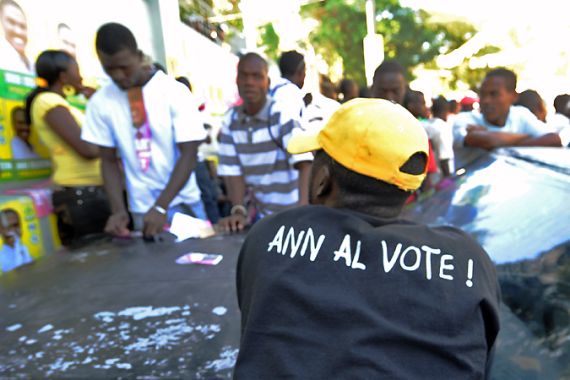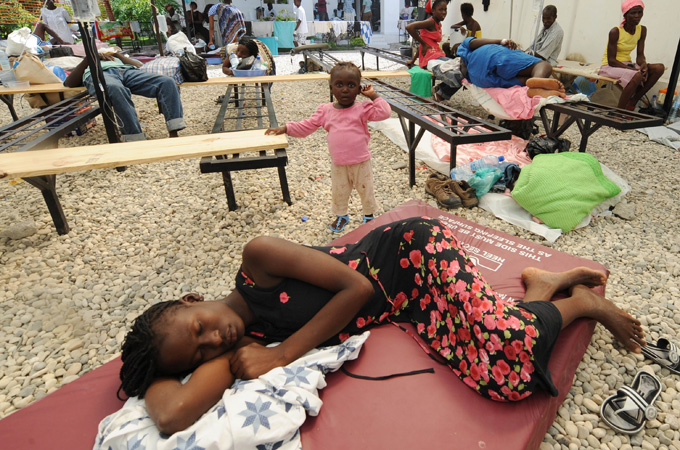Fraud fears ahead of Haiti election
Sunday’s presidential elections are going ahead, despite a worsening cholera epidemic and voter registration woes.

| Earthquake-hit Caribbean country heads for turbulent elections whilst in the grip of a cholera epidemic |
Haiti’s first presidential elections since January’s devastating earthquake is set to go ahead as planned, despite a worsening cholera epidemic and voter registration woes.
Fears of fraud are adding to Haiti’s widespread problems ahead of Sunday’s presidential and legislative elections, but despite the challenges of holding a nationwide poll in the earthquake-hit Caribbean country, UN officials insist the elections are needed in order to increase stability.
Meanwhile, as the death toll from cholera across Haiti soared past 1,600 and the number of confirmed infections approached 70,000, candidates continued their aggressive campaigns to decide a successor to Rene Preval, the Haitian president.
‘Fraud everywhere’
The head of Haiti’s electoral registration, which signs up eligible voters and is tasked with verifying identity cards on election day, voiced fears that widespread fraud could “hijack” the results of Sunday’s crucial poll.
“I think there will be fraud everywhere,” Philippe Augustin said.
Richard Dumel of the provisional electoral council said he was aware of fraudulent papers in circulation but insisted that election organisers had “the technical means of detecting false ballots and false tally sheets”.
Leading the race to the ruined palace are Jude Celestin, the ruling party candidate backed by Preval, and Mirlande Manigat, a 70-year-old former first lady and academic who is ahead in most opinion polls and could become Haiti’s first female president.
| Special Report | |
|
None of the 18 candidates are expected to pass the 50 per cent threshold for outright victory, meaning a January 16 run-off would be required. Results of the first round may not be known until December.
Roger Annis from the Canada Haiti Action Network told Al Jazeera that although fraud is certainly an issue in this election it is not “the principal one”.
“Our principal concern from the beginning has been the exclusion of political parties from this process,” Annis said.
“This issue combined with the fact that Haiti lacks the necessary capacity needed to register voters has led to us to raise serious questions of concern about why Canada and the other major powers are supporting this election so vigorously.”
The lead-up to the election has been marred by deadly clashes between rival political factions and anti-UN riots in the northern city of Cap-Haitien over the growing cholera outbreak.
‘Blunders, dirty tricks’
Edmond Mulet, the head of the UN peacekeeping mission in Haiti (Minustah), offered reassurances, and insisted that things were “calm, peaceful, serene and without violence” compared to polls in previous years.
“There were two deaths two days ago; there was friction but a lot less than the country saw in the past. There will be blunders, dirty tricks, but there will be less than in the past,” Mulet said.
 |
| The elections are not expected to increase the spread of cholera, according to a UN health official [AFP] |
Haitian officials have ignored calls to delay the vote, and in Washington on Thursday a senior UN health official said that going forward with the elections was not expected to increase the spread of cholera.
Jon Andrus, deputy director of the Pan American Health Organisation (Paho), pointed out that cholera is transmitted almost exclusively through fecal contamination of water and food.
“The kind of movement and congregating you see with people going to vote is not the kind of movement that creates an increased risk of cholera transmission,” Andrus said. “Close contact does not put people at greater risk of cholera the way it would, for example, for flu.”
Mulet reiterated that all cholera tests so far on Nepalese peacekeepers, who are accused of bringing the disease into the country, have proved negative.
The Nepalese were placed under special protection after the protests last week, which followed accusations that cholera leaked into the central Artibonite River from infected feces in their camp.
UN mandate
Although the UN security council renewed Minustah’s mandate for another year in October, Mulet said that if the elections pass without incident there could be a reappraisal in the middle of next year.
“If we have good elections now and if there is a democratic transfer of power … and the installation of a new national assembly next year, then we will analyse the security situation in the country in April and May 2011.”
That process could see a return to “a plan that we established at the end of 2009 for the reduction and eventual departure of the mission.”
Haiti’s next president faces the daunting task of rebuilding a traumatised nation of 10 million still struggling to recover from the earthquake more that flattened Port-au-Prince and claimed 250,000 lives nearly 10 months ago.
Some 1.3 million people displaced by the quake still live in tent cities in the capital – hundreds of thousands more inhabit sprawling, sometimes violent slums – all now subject to the spiralling cholera epidemic.
Al Jazeera’s Sebastian Walker, reporting from Port-au-Prince, said the fact that people are still living in refugee camps for IDPs (Internally Displaced Persons) or tent cities as they have come to be known in Haiti – poses “innumerable logistical challenges” especially when it comes to voter registrations.
“According to a senior UN official, in order to get this done logistically they are sending polling stations, makeshift booths, out to the vicinity of these populations and into these large IDP camps. Around 11,000 of these will be set up around the country to try to make it easier for people to vote,” he said.
More than four million Haitians are eligible to vote in the elections that will also see 11 of the country’s 30 senators and all 99 parliamentary deputies chosen.
Some 3,200 UN police will joint almost 9,000 Haitian security forces to police the vote.
